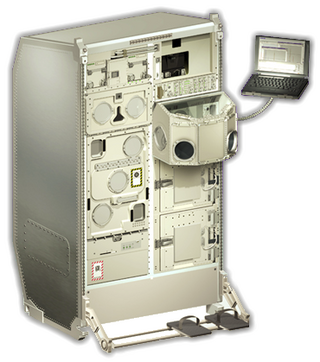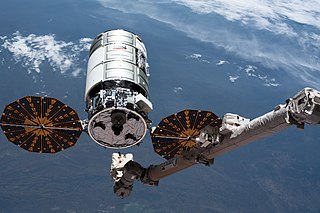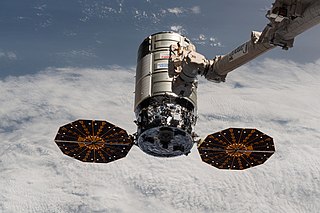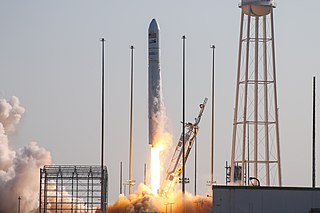Related Research Articles

Biolab is a single-rack multi-user science payload designed for use in the Columbus laboratory of the International Space Station. Biolab support biological research on small plants, small invertebrates, microorganisms, animal cells, and tissue cultures. It includes an incubator equipped with centrifuges in which the preceding experimental subjects can be subjected to controlled levels of accelerations.

Commercial Resupply Services (CRS) are a series of flights awarded by NASA for the delivery of cargo and supplies to the International Space Station (ISS) on commercially operated spacecraft. The first CRS contracts were signed in 2008 and awarded $1.6 billion to SpaceX for twelve cargo Dragon and $1.9 billion to Orbital Sciences for eight Cygnus flights, covering deliveries to 2016. The Falcon 9 and Antares rockets were also developed under the CRS program to deliver cargo spacecraft to the ISS.

Nanoracks LLC is a private in-space services companywhich builds space hardware and in-space repurposing tools.The company also facilitates experiments and launches of CubeSats to Low Earth Orbit.

Orbital-3, also known as Orb-3, was an attempted flight of Cygnus, an automated cargo spacecraft developed by United States-based company Orbital Sciences, on 28 October 2014. The mission was intended to launch at 22:22:38 UTC that evening. This flight, which would have been its fourth to the International Space Station and the fifth of an Antares launch vehicle, resulted in the Antares rocket exploding seconds after liftoff.

SpaceX CRS-6, also known as SpX-6, was a Commercial Resupply Service mission to the International Space Station, contracted to NASA. It was the eighth flight for SpaceX's uncrewed Dragon cargo spacecraft and the sixth SpaceX operational mission contracted to NASA under a Commercial Resupply Services contract. It was docked to the International Space Station from 17 April to 21 May 2015.

OA-4, previously known as Orbital-4, was the fourth successful flight of the Orbital ATK uncrewed resupply spacecraft Cygnus and its third flight to the International Space Station (ISS) under the Commercial Resupply Services (CRS-1) contract with NASA. With the Antares launch vehicle undergoing a redesign following its failure during the Orb-3 launch, OA-4 was launched by an Atlas V launch vehicle. Following three launch delays due to inclement weather beginning on 3 December 2015, OA-4 was launched at 21:44:57 UTC on 6 December 2015. With a liftoff weight of 7,492 kg (16,517 lb), OA-4 became the heaviest payload ever launched on an Atlas V. The spacecraft rendezvoused with and was berthed to the ISS on 9 December 2015. It was released on 19 February 2016 after 72 days at the International Space Station. Deorbit occurred on 20 February 2016 at approximately 16:00 UTC.

OA-5, previously known as Orbital-5, was the seventh planned flight of the Orbital Sciences' uncrewed resupply spacecraft Cygnus and its sixth flight to the International Space Station under the Commercial Resupply Services contract with NASA. The mission launched on 17 October 2016 at 23:45:36 UTC. Orbital Sciences and NASA jointly developed a new space transportation system to provide commercial cargo resupply services to the International Space Station (ISS). Under the Commercial Orbital Transportation System (COTS) program, Orbital designed and built Antares, a medium-class launch vehicle; Cygnus, an advanced maneuvering spacecraft; and a Pressurized Cargo Module which is provided by Orbital's industrial partner Thales Alenia Space.

The Nanoracks CubeSat Deployer (NRCSD) is a device to deploy CubeSats into orbit from the International Space Station (ISS).

OA-6, previously known as Orbital-6, is the sixth flight of the Orbital ATK uncrewed resupply spacecraft Cygnus and its fifth flight to the International Space Station under the Commercial Resupply Services (CRS) contract with NASA. The mission launched on 23 March 2016 at 03:05:52 UTC.

OA-7, previously known as Orbital-7, is the eighth flight of the Orbital ATK uncrewed resupply spacecraft Cygnus and its seventh flight to the International Space Station (ISS) under the Commercial Resupply Services contract with NASA. The mission launched on 18 April 2017 at 15:11:26 UTC. Orbital and NASA jointly developed a new space transportation system to provide commercial cargo resupply services to the International Space Station (ISS). Under the Commercial Orbital Transportation Services (COTS) program, then Orbital Sciences designed and built Antares, a medium-class launch vehicle; Cygnus, an advanced maneuvering spacecraft, and a Pressurized Cargo Module which is provided by Orbital's industrial partner Thales Alenia Space.

OA-8E was the ninth flight of the Orbital ATK uncrewed resupply spacecraft Cygnus and its eighth flight to the International Space Station (ISS) under the Commercial Resupply Services (CRS-1) contract with NASA. The mission launched on 12 November 2017 at 12:19:51 UTC. Orbital and NASA jointly developed a new space transportation system to provide commercial cargo resupply services to the International Space Station (ISS). Under the Commercial Orbital Transportation System (COTS) program, then Orbital Sciences designed and built Antares, a medium-class launch vehicle; Cygnus, an advanced maneuvering spacecraft, and a Pressurized Cargo Module which is provided by Orbital's industrial partner Thales Alenia Space.

OA-9E was the tenth flight of the Orbital ATK uncrewed resupply spacecraft Cygnus and its ninth flight to the International Space Station (ISS) under the Commercial Resupply Services with NASA. The mission launched on 21 May 2018 at 08:44:06 UTC. Orbital ATK and NASA jointly developed a new space transportation system to provide commercial cargo resupply services to the International Space Station. Under the Commercial Orbital Transportation Services (COTS) program, then Orbital Sciences designed and built Antares, a medium-class launch vehicle; Cygnus, an advanced maneuvering spacecraft, and a Pressurized Cargo Module which is provided by Orbital's industrial partner Thales Alenia Space.

NG-10, previously known as OA-10E, is the eleventh flight of the Northrop Grumman uncrewed resupply spacecraft Cygnus and its tenth flight to the International Space Station under the Commercial Resupply Services (CRS-1) contract with NASA. The mission launched on 17 November 2018, at 09:01:31 UTC. This particular mission is part of an extension of the initial CRS contract that enables NASA to cover the ISS resupply needs until the Commercial Resupply Services-2 (CRS-2) contract enters in effect.
The ISS U.S. National Lab, commonly known as the ISS National Lab, is a U.S. government-funded national laboratory established on 30 December 2005 by the 2005 NASA Authorization Act. With principal research facilities located in the United States Orbital Segment (USOS) of the International Space Station (ISS), the Laboratory conducts research in life sciences, physical sciences, technology development and remote sensing for a broad range of academic, government and commercial users. Of the 270 payloads that the Center for the Advancement of Science in Space (CASIS) has sent to the ISS, 176 have been for commercial companies including Merck & Co., Novartis, Eli Lilly and Company, Hewlett Packard Enterprise, Honeywell, and Procter & Gamble.

NG-12, previously known as OA-12, was the thirteenth flight of the Northrop Grumman robotic resupply spacecraft Cygnus and its twelfth Commercial Resupply Services flight to the International Space Station (ISS) for NASA. The mission launched on 2 November 2019 at 13:59:47 UTC). This was the first launch of Cygnus under the Commercial Resupply Services 2 (CRS-2) contract.

NG-13, previously known as OA-13, was the fourteenth flight of the Northrop Grumman robotic resupply spacecraft Cygnus and its thirteenth flight to the International Space Station (ISS) under the Commercial Resupply Services (CRS-1) contract with NASA. The mission launched on 15 February 2020 at 20:21:01 UTC after nearly a week of delays. This is the second launch of Cygnus under the CRS-2 contract.

NG-14, previously known as OA-14, was the fifteenth flight of the Northrop Grumman robotic resupply spacecraft Cygnus and its fourteenth flight to the International Space Station under the Commercial Resupply Services (CRS-1) contract with NASA. The mission was launched on 3 October 2020, at 01:16:14 UTC.

NG-15, previously known as OA-15, was the fifteenth launch of the Northrop Grumman robotic resupply spacecraft Cygnus and its fourteenth flight to the International Space Station (ISS) under the Commercial Resupply Services (CRS) contract with NASA. The mission launched on 20 February 2021 at 17:36:50 UTC. This is the fourth launch of Cygnus under the CRS-2 contract.

Cygnus NG-16, previously known as Cygnus OA-16, was the sixteenth flight of the Northrop Grumman robotic resupply spacecraft Cygnus and its fifteenth flight to the International Space Station (ISS) under the Commercial Resupply Services (CRS-2) contract with NASA. The mission was launched on 10 August 2021 at 22:01:05 UTC, for a (planned) 90-day mission at the ISS. This was the fifth launch of Cygnus under the CRS-2 contract.
References
- ↑ https://www.linkedin.com/company/10493094?trk=tyah&trkInfo=clickedVertical%3Acompany%2CclickedEntityId%3A10493094%2Cidx%3A2-3-4%2CtarId%3A1459262470528%2Ctas%3Adreamup%20 [ self-published source ]
- ↑ "Voyager Space Holdings, Inc. Acquires Majority Stake of X.O. Markets, Parent of Nanoracks". PR Newswire . Retrieved 2023-01-09.
- ↑ "NanoRacks MixStix". NanoRacks.
- ↑ "NanoRacks Microscopes". ISS Payloads Office Fact Sheet. NASA . Retrieved 2013-02-18.
- ↑ "NanoRacks is Making Space Science Affordable for Everyone". Forbes .
- ↑ "NanoRacks is Making Space Science Affordable for Everyone". Forbes .
- ↑ "NanoRacks Platforms". ISS Payloads Office Fact Sheet. NASA. Retrieved 2013-02-18.